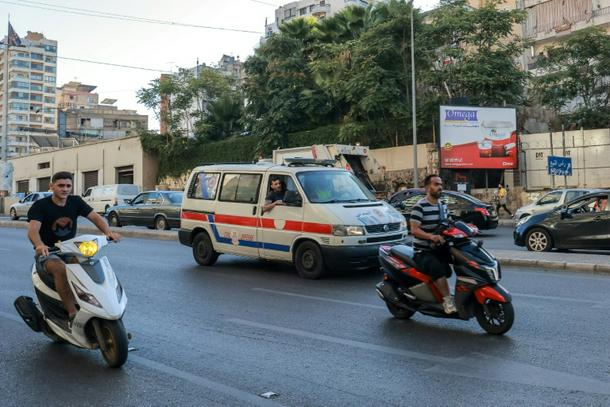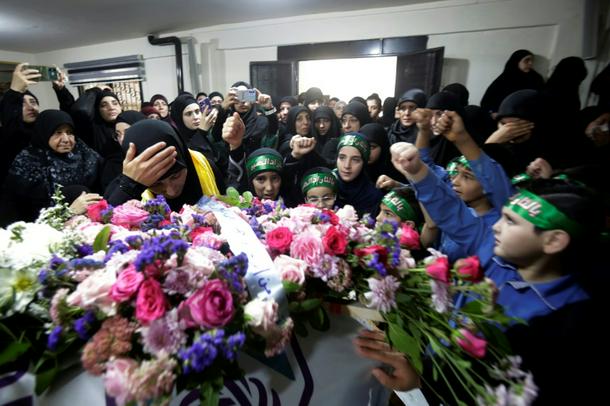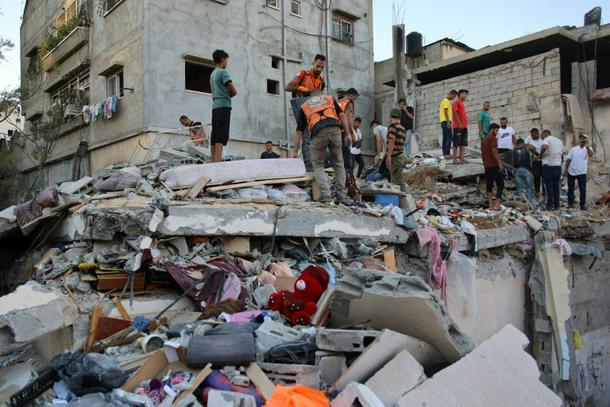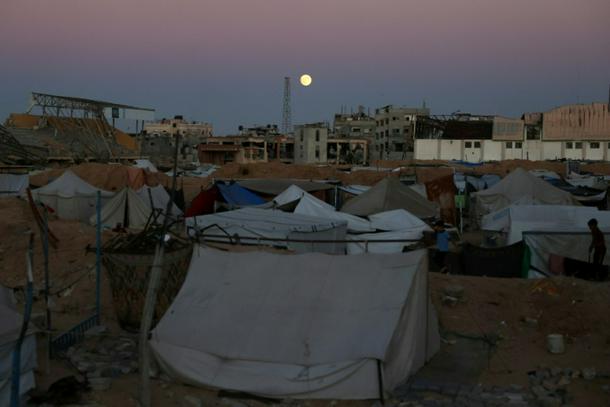
A Lebanese Red Cross ambulance rushes wounded people to hospital in Beirut after explosions hit Hezbollah strongholds around the country
Beirut (Lebanon) (AFP) - Hezbollah vowed on Wednesday to retaliate against Israel after hundreds of paging devices used by the militant group exploded in a deadly wave across Lebanon, raising fears of an all-out war.
There was no comment from Israel on the explosions that killed 12 people, including two children, and wounded up to 2,800 others.
Only hours before the blasts, Israel said it was broadening the aims of the Gaza war, sparked by Hamas’s October 7 attack, to include its fight against the Palestinian armed group’s ally Hezbollah.
Hezbollah said Israel was “fully responsible for this criminal aggression” and on Wednesday reiterated it would avenge the attack, while vowing to continue its fight against Israel in support of Hamas in the Gaza war.
Cross-border exchanges with Israeli forces were “ongoing and separate from the difficult reckoning that the criminal enemy must await for its massacre,” Hezbollah, which is backed by Israel’s regional foe Iran, said on Telegram.
Hezbollah leader Hassan Nasrallah is due to give a televised address on Thursday.

Israeli troops and Hezbollah fighters have exchanged fire almost daily since the start of the Gaza war
The blasts killed two children and 10 other people, Lebanese Health Minister Firass Abiad said, putting the number of wounded at between 2,750 and 2,800 with some taken to Syria or Iran for treatment.
The influx of so many casualties all at once overwhelmed hospitals in Hezbollah strongholds.
At a Beirut hospital, doctor Joelle Khadra said “the injuries were mainly to the eyes and hands, with finger amputations, shrapnel in the eyes – some people lost their sight.”
A doctor at another hospital in Beirut, requesting anonymity because he was not authorised to speak to the media, said he had worked through the night and that the injuries were “out of this world – never seen anything like it”.
- Hospitals overwhelmed -
Experts said Israeli operatives had likely planted explosives on the paging devices before they were delivered to Hezbollah.

Relatives mourn Fatima Abdallah, a 10-year-old girl killed in the pager explosions
“This was more than lithium batteries being forced into override,” said Charles Lister of the Middle East Institute.
“A small plastic explosive was almost certainly concealed alongside the battery, for remote detonation via a call or page,” the analyst said, adding Israel’s spy agency “Mossad infiltrated the supply chain”.
Among the dead was the 10-year-old daughter of a Hezbollah member, killed in east Lebanon’s Bekaa Valley when her father’s pager exploded, the family and a source close to the group said.
Tehran’s ambassador in Beirut was hurt but his injuries were not serious, Iranian state media reported.
Iran’s President Masoud Pezeshkian condemned the attack, decrying Western support for Israeli “crimes, killings and indiscriminate assassinations”.
The attack dealt a heavy blow to the militant group, which already had concerns about the security of its communications after losing several key commanders to targeted air strikes in recent months.

Palestinian medics dig through the rubble of a building as they search for survivors after an Israeli strike on Gaza City
A source close to Hezbollah, asking not to be identified, told AFP the pagers were “recently imported” and appeared to have been “sabotaged at source”.
After The New York Times reported the pagers had been ordered from Taiwanese manufacturer Gold Apollo, the company said they had been produced by its Hungarian partner BAC Consulting KFT.
BAC Consulting CEO Cristiana Barsony-Arcidiacono told US broadcaster NBC they “don’t make the pagers. I am just the intermediate.”
As fears again surged of a regional conflagration nearly a year into the Gaza war, Lufthansa and Air France announced the suspension of flights to Tel Aviv, Tehran and Beirut until Thursday.
- ‘Extremely volatile’ -
Hours before the attack, Israel said it was broadening the aims of the Gaza war against Hamas to include its fight against Hezbollah.
Since October, the unabating exchanges of fire between Israeli troops and Hezbollah have killed hundreds of mostly fighters in Lebanon, and dozens including soldiers on the Israeli side.

Tents sheltering displaced Palestinians at a makeshift camp in southern Gaza's Khan Yunis
They have also forced tens of thousands of people on both sides of the border to flee their homes.
On Monday, Israeli Defence Minister Yoav Gallant warned that failing a political solution, “military action” would be “the only way left to ensure the return” of displaced residents to the border area.
UN rights chief Volker Turk said Tuesday’s attack had come at an “extremely volatile time”, calling the blasts “shocking” and their impact on civilians “unacceptable”.
US Secretary of State Antony Blinken was in Cairo on Wednesday to try to salvage ceasefire talks for the Israel-Hamas war in Gaza.
In a meeting with the US envoy, Egypt’s President Abdel Fattah al-Sisi vowed to intensify peace talks.
US officials have expressed increasing frustration with Israel, which has rejected US assessments that a deal is nearly complete and insisted on an Israeli military presence on the Egypt-Gaza border.
The October 7 attack on southern Israel that sparked the war resulted in the deaths of 1,205 people, mostly civilians, according to an AFP tally based on official Israeli figures.
Militants also seized 251 hostages, 97 of whom are still held in Gaza, including 33 the Israeli military says are dead.
Israel’s retaliatory military offensive has killed at least 41,252 people in Gaza, according to the Hamas-run territory’s health ministry, which does not provide a breakdown of civilian and militant deaths.
On Wednesday, UN member states were set to vote on a push to demand an end to the Israeli occupation of all Palestinian territories within 12 months.
General Assembly votes are not binding, but Israel has already firmly rejected the resolution.
In Gaza, the civil defence agency said an Israeli air strike on a school-turned-shelter killed five people, while the Israeli military said it targeted Hamas militants.
burs-ami/dv